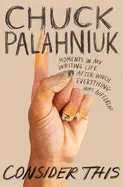
Consider This - by Chuck Palahniuk
ISBN: 1538717972Date read: 2020-10-03
How strongly I recommend it: 5/10
(See my list of 430+ books, for more.)
Go to the Amazon page for details and reviews.
Author of “Fight Club” with some thoughts and stories about writing and life. I read it looking only for thoughts on the craft of writing, but actually the stories and random insights were useful and interesting. (“What dogs want is for no one to ever leave.” “No two people ever walk into the same room.”)
my notes
Bring out a new book every year. Never go longer than sixteen months without something new because after sixteen months people quit asking if you have another book yet.
How people talk:
Description combined with occasional instruction, and punctuated with sound effects or exclamations.
(So write like people talk.)
Andy Warhol's motto of his life was “So what?”
No matter what happened, good or bad, he could dismiss the event by thinking, So what?
Writers write because they weren’t invited to a party.
So bear in mind that the reader is also alone.
Consider creating a “template” chapter.
Using one existing chapter, change minor details and make it arrive at a fresh epiphany.
Chances are the reader won’t realize what you’ve done, but will unconsciously recognize the repeated structure.
Use this template to create three chapters placed equal distances apart in the book.
So many successful plots begin at the family plot, because for most of us - especially among young people - our worst fear is of losing our parents. If you create a world where one or both parents have died, you’re creating characters that have survived your reader’s worst fears. Your reader will respect them from the get-go.
A dead parent bonds the surviving family in ways your reader would like to be bonded with his or her family.
What dogs want is for no one to ever leave.
When you’re single you date other singles. When you’re a couple you date other couples.
Reading that brilliant insight, I was willing to believe anything she put on the page after that.
A wise, intuitive observation can convey more power than all the facts in Wikipedia.
A well-worded aphorism carries all the authority of Confucius or Oscar Wilde.
Hemingway’s first writing job was as a reporter covering the crime beat on the Kansas City Star. He took to heart the paper’s in-house style guide, which demanded short, choppy sentences filled with active verbs. And for the rest of his career he wrote terse prose based on that same highly readable newspaper style.
People from larger families always use a clause to seize attention before they say anything.
The idiot character is more fun to hear because he bends the language for his purpose.
Write the most outlandish, challenging, provocative stories.
To convince a reader of something beyond his own experience, start with what he does know, and you move in baby steps toward what he doesn’t.
Readers recoil from the pronoun “I” because it constantly reminds them that they, themselves, are not experiencing the plot events.
We hate that, when we’re stuck listening to someone whose stories are all about himself.
Submerge the I. Always keep your camera pointed elsewhere, describing other characters. Strictly limit a narrator’s reference to self.
Example: Dr. Watson gushing about Sherlock Holmes - because a heroic character telling his own story would be boring and off-putting.
Write in the first person, but weed out almost all of your pesky “I”s.
No two people ever walk into the same room.
How your character describes the world doesn’t have to be based on anything factual. Actually, it’s more interesting if a character views the world through a mistake.
People decide the nature of their world at a very young age. And they craft a way of behaving that will lead to success.
You’re praised for being a strong little kid so you invest in your strength. Or you become the smart girl. Or the funny boy. Or the pretty girl. And this works until you’re about thirty years old.
After your schooling is over, you recognize your chosen way of winning has become a trap. And a trap with diminishing rewards. You’re a clown no one will take seriously. Or you’re a beauty queen who sees her looks fading. You’re forced to realize your identity was a choice, and then to choose another.
But you know this next strategy will never have the same passion as the one you’d chosen as a child. Now you’re especially aware that it’s a choice. And you know it, too, will likely fade.